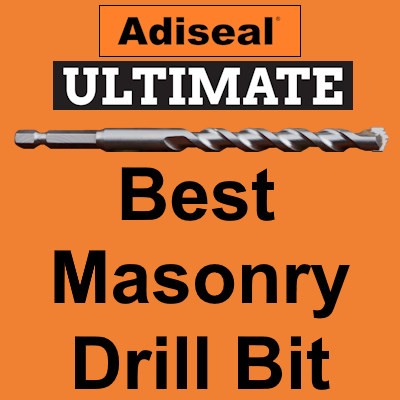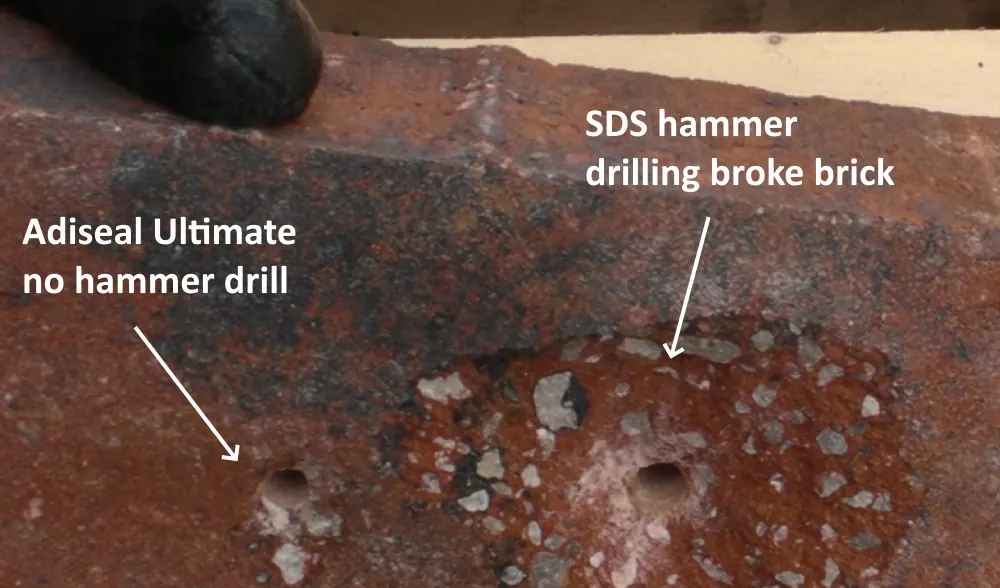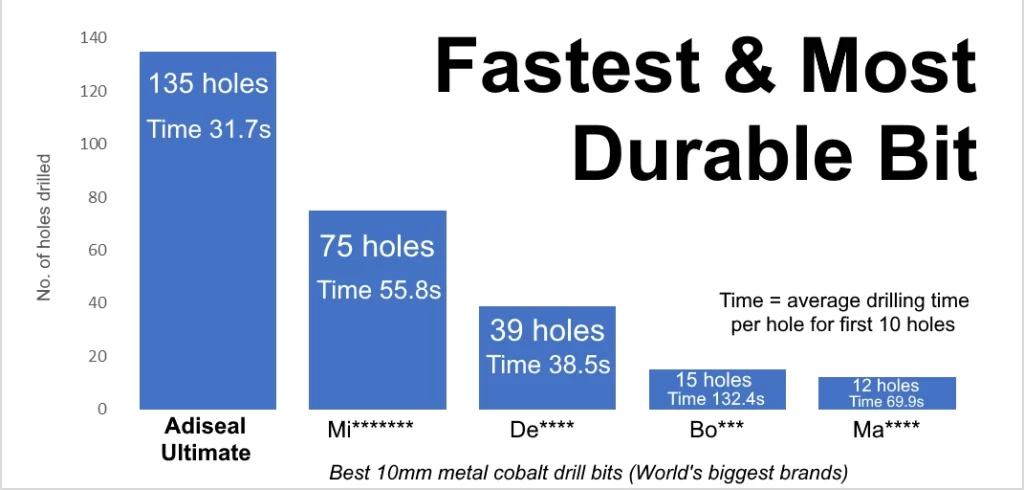Masonry Drill Bit
Best Masonry Drill Bits for Brick, Concrete, Stone, Multi-Material
Adiseal Ultimate masonry drill bit has been shown to be the best masonry drill bit. It drills faster and lasts longer than any other masonry or multi-material drill bit when drilling without hammer function. Drilling masonry without hammer function on the drill has numerous advantages over hammer drilling. Adiseal Ultimate 1/4 inch hex shank masonry carbide bit can drill into brick, concrete, stone, wood, plastic & many other materials.
- What are the advantages of no hammer drilling?
- Speed test compared to SDS drill bit
- How to use a masonry drill bit and multi material drill bit
- What materials can they drill?
What are the advantages of no hammer drilling?
Some of the advantages of drilling without hammer instead of hammer drilling include:
- Quieter drilling
- Less vibration damage on hands
- Can drill closer to an edge
- Less risk of loosening mortar
- Less risk of damaging substrate
- Drills more accurate cut holes
The 1/4 inch hex shank also prevents the carbide masonry drill bit from spinning in the chuck and allows quicker changes.

Quieter drilling
Drilling with the hammer function on will result in loud drilling. This has the potential to damage hearing and also cause disturbance to other people. No hammer drilling results in quieter drilling, reducing the chance of damaging hearing and also disturbing other people.
Less vibration damage to hands
Using tools daily that vibrate can result in damage to hands. One of the problems that could arise is vibration white hand syndrome. Drilling without the hammer function reduces the amount of vibration on the hands and in turn reducing the chance of developing vibration white hands syndrome.
Can drill closer to an edge
When drilling close to an edge with a hammer drill, it’s easy to break the substrate, especially hard materials like brick and concrete. Drilling without the hammer function can make it safer to drill closer to an edge without breaking the material.
Less risk of loosening mortar
When drilling into materials like concrete or brick with a hammer drill, it’s possible to loosen the brick and mortar. Drilling without the hammer function reduces the chance of doing this making it more suitable for drilling brick walls.
Less risk of damaging substrate
With hammer drilling on hard materials like brick or concrete, it’s possible the substrate will break due to the hammer action of the masonry drill bit hitting the material. This can be especially problematic where the brick has been chased out for example to fit a electrical back box in. Drilling brick or concrete without hammer reduces the chance of breaking the substrate resulting in more safer drilling.
The image below shows the results of drilling into brick with no hammer Adiseal Ultimate drill bit compared to drilling with a SDS hammer drill bit. As can be seen in the image, the SDS hammer drill bit has broken a big chunk out of the brick when it drilled through to the other side of the brick. The same problem did not happen with the Adiseal Ultimate drill bit for masonry when drilling without hammer function.

Drills more accurate cut holes
When a drill bit hits the hard substrate due to the hammer function, the hole will be damaged resulting in a less accurate cut hole. To avoid this happening, drilling without hammer function will result in more accurate cut holes.
Speed test compared to SDS drill bit
In our test drilling into a brick using a carbide Adiseal Ultimate 6mm masonry drill bit in a basic cordless drill set to drill without hammer function, it managed to drill as fast as a corded SDS 6mm hammer drill. They both took 5 seconds to drill into the brick but the SDS hammer drill broke the brick which is a common problem with hammer drills. This was not the case with the no hammer drilling of Adiseal Ultimate masonry & multi material carbide drill bit.
How to use a masonry drill bit and multi-material drill bit
How to use a masonry drill bit & multi-material drill bit
- Set the Drill Speed
Depending on the material you’re drilling into, set your drill to the appropriate speed. Many masonry drill bits and multi-material bits work well at medium to high speeds.
- Mark Your Drilling Location
Use a pencil or a marker to mark the precise location where you want to drill your hole. This will help you maintain accuracy in your drilling.
- Apply Steady Pressure
Position the drill bit tip directly over the marked spot on your material. Apply steady, even pressure as you start drilling. Be sure to keep the drill level and perpendicular to the material’s surface.
- Start Drilling
Begin drilling at a slow and controlled speed. As you penetrate the material, you can gradually increase the speed for faster progress. Pay attention to the feel of the drill and adjust the pressure as needed to maintain control.
- Clear Debris
Periodically withdraw the drill bit to clear away any accumulated debris. This helps prevent overheating and ensures a clean hole.
- Complete the Drilling
Continue drilling until you’ve reached the desired depth. Be patient and avoid forcing the drill, especially when drilling through harder materials like masonry.
- Withdraw the Drill Bit
After completing the drilling, turn off the drill and carefully withdraw the drill bit from the hole.
- Inspect and Clean
Examine the hole to ensure it meets your requirements. If necessary, clean up any remaining debris or sharp edges.
What materials can they drill?
Adiseal Ultimate masonry drill bit & multi-material drill bit can drill into many different materials including:
Sizes available
Adiseal Ultimate hex shank masonry drill bit (multi-material) is currently available in the following sizes:
- 4mm x 100mm
- 5mm x 100mm
- 5.5mm x 150mm
- 6mm x 150mm
- 6.5mm x 150mm
- 8mm x 150mm
- 10mm x 150mm
- 12mm x 150mm
- 12mm x 400mm (Extra long masonry drill bit)
Best metal drill bit
In their attempt to make available the best drill bits, also in the Adiseal Ultimate range is the fastest and most durable metal drill bit. In out test drilling into stainless steel with a drill press, it drilled faster and drilled more holes than any other cobalt metal drill bit. It was easily the best metal drill bit and it beat the best metal drill bits from the worlds biggest brands including Milwaukee Cobalt Red, DeWalt Extreme, Bosch Cobalt & Makita.

| 10mm metal cobalt drill bit | Total number of holes drilled (in 6mm stainless steel) | Time to drill each holes (average of 1st 10 hole) |
| Adiseal Ultimate cobalt | 135 holes | 31.7 seconds |
| Milwaukee cobalt red | 75 holes | 55.8 seconds |
| DeWalt Extreme cobalt | 39 holes | 38.5 seconds |
| Bosch cobalt | 15 holes | 132.4 seconds |
| Makita cobalt | 12 holes | 69.9 seconds |
Where to buy the best masonry drill bit
To buy masonry drill bit and multi material drill bits in the UK, please contact us for details of you local stockist. For other countries that do not have a Adiseal distributor, please visit www.guglue.com
Masonary drill bit
When people are talking about masonary drill bits, they actually mean masonry drill bit. The correct spelling is masonry drill bit, not masonary drill bit.
Frequently asked questions about masonry drill bit & multi material drill bits
Adiseal Ultimate masonry drill bit has been shown to be the fastest product when drilling without hammer function. It has many advantages over hammer drilling including quieter drilling, less vibration damage & less risk of damage to substrate.
Multi-material drill bits are versatile tools designed to drill holes in various materials, including wood, metal, plastic, concrete, and more.
Multi-material drill bits are designed with specialized tips and cutting edges that allow them to penetrate different materials without the need for frequent bit changes.
Some multi-material drill bits are equipped with carbide or tungsten tips, making them suitable for drilling into concrete or masonry.
Yes, multi-material drill bits can generally be used with standard cordless drills or drill presses.
Yes, multi-material drill bits are versatile tools suitable for both DIY enthusiasts and professional tradespeople, making them a valuable addition to any toolbox.
Masonry drill bits are designed for drilling holes in hard materials like concrete, brick, stone, and masonry.
